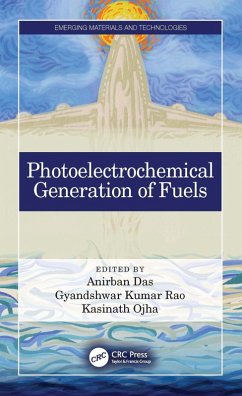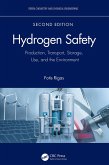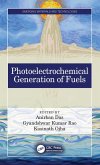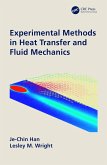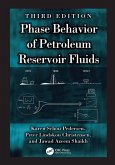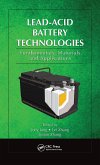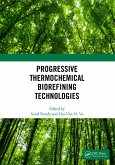Photoelectrochemical Generation of Fuels (eBook, PDF)
Redaktion: Das, Anirban; Ojha, Kasinath; Rao, Gyandshwar Kumar
48,95 €
48,95 €
inkl. MwSt.
Sofort per Download lieferbar

24 °P sammeln
48,95 €
Als Download kaufen

48,95 €
inkl. MwSt.
Sofort per Download lieferbar

24 °P sammeln
Jetzt verschenken
Alle Infos zum eBook verschenken
48,95 €
inkl. MwSt.
Sofort per Download lieferbar
Alle Infos zum eBook verschenken

24 °P sammeln
Photoelectrochemical Generation of Fuels (eBook, PDF)
Redaktion: Das, Anirban; Ojha, Kasinath; Rao, Gyandshwar Kumar
- Format: PDF
- Merkliste
- Auf die Merkliste
- Bewerten Bewerten
- Teilen
- Produkt teilen
- Produkterinnerung
- Produkterinnerung

Bitte loggen Sie sich zunächst in Ihr Kundenkonto ein oder registrieren Sie sich bei
bücher.de, um das eBook-Abo tolino select nutzen zu können.
Hier können Sie sich einloggen
Hier können Sie sich einloggen
Sie sind bereits eingeloggt. Klicken Sie auf 2. tolino select Abo, um fortzufahren.

Bitte loggen Sie sich zunächst in Ihr Kundenkonto ein oder registrieren Sie sich bei bücher.de, um das eBook-Abo tolino select nutzen zu können.
Photoelectrochemical processes due to the symbiosis of photochemical and electrochemical processes result in unique reaction pathways and products. This technique Catalyzed by nanomaterials is extensively used to harness sunlight for production of fuels and chemical feedstocks.
- Geräte: PC
- ohne Kopierschutz
- eBook Hilfe
Andere Kunden interessierten sich auch für
![Hydrogen Safety (eBook, PDF) Hydrogen Safety (eBook, PDF)]() Fotis RigasHydrogen Safety (eBook, PDF)135,95 €
Fotis RigasHydrogen Safety (eBook, PDF)135,95 €![Photoelectrochemical Generation of Fuels (eBook, ePUB) Photoelectrochemical Generation of Fuels (eBook, ePUB)]() Photoelectrochemical Generation of Fuels (eBook, ePUB)48,95 €
Photoelectrochemical Generation of Fuels (eBook, ePUB)48,95 €![Experimental Methods in Heat Transfer and Fluid Mechanics (eBook, PDF) Experimental Methods in Heat Transfer and Fluid Mechanics (eBook, PDF)]() Je-Chin HanExperimental Methods in Heat Transfer and Fluid Mechanics (eBook, PDF)42,95 €
Je-Chin HanExperimental Methods in Heat Transfer and Fluid Mechanics (eBook, PDF)42,95 €![Phase Behavior of Petroleum Reservoir Fluids (eBook, PDF) Phase Behavior of Petroleum Reservoir Fluids (eBook, PDF)]() Karen Schou PedersenPhase Behavior of Petroleum Reservoir Fluids (eBook, PDF)125,95 €
Karen Schou PedersenPhase Behavior of Petroleum Reservoir Fluids (eBook, PDF)125,95 €![Biogas Technology in Nigeria (eBook, PDF) Biogas Technology in Nigeria (eBook, PDF)]() Isaac Nathaniel ItodoBiogas Technology in Nigeria (eBook, PDF)21,95 €
Isaac Nathaniel ItodoBiogas Technology in Nigeria (eBook, PDF)21,95 €![Lead-Acid Battery Technologies (eBook, PDF) Lead-Acid Battery Technologies (eBook, PDF)]() Lead-Acid Battery Technologies (eBook, PDF)197,95 €
Lead-Acid Battery Technologies (eBook, PDF)197,95 €![Progressive Thermochemical Biorefining Technologies (eBook, PDF) Progressive Thermochemical Biorefining Technologies (eBook, PDF)]() Progressive Thermochemical Biorefining Technologies (eBook, PDF)46,95 €
Progressive Thermochemical Biorefining Technologies (eBook, PDF)46,95 €-
-
-
Photoelectrochemical processes due to the symbiosis of photochemical and electrochemical processes result in unique reaction pathways and products. This technique Catalyzed by nanomaterials is extensively used to harness sunlight for production of fuels and chemical feedstocks.
Dieser Download kann aus rechtlichen Gründen nur mit Rechnungsadresse in A, B, BG, CY, CZ, D, DK, EW, E, FIN, F, GR, HR, H, IRL, I, LT, L, LR, M, NL, PL, P, R, S, SLO, SK ausgeliefert werden.
Produktdetails
- Produktdetails
- Verlag: Taylor & Francis eBooks
- Seitenzahl: 220
- Erscheinungstermin: 31. Oktober 2022
- Englisch
- ISBN-13: 9781000751185
- Artikelnr.: 65700956
- Verlag: Taylor & Francis eBooks
- Seitenzahl: 220
- Erscheinungstermin: 31. Oktober 2022
- Englisch
- ISBN-13: 9781000751185
- Artikelnr.: 65700956
- Herstellerkennzeichnung Die Herstellerinformationen sind derzeit nicht verfügbar.
Dr. Anirban Das is an Associate Professor in the Amity School of Applied Sciences at Amity University Haryana, India. His interests are in in catalysis including chemical and photo(electro) catalysis, organometallics, kinetics and nanotechnology. He obtained a BSc (Chemistry Honours) degree from Delhi University, India, an MS (Chemistry) from the University of Toledo, Ohio (Prof. Mark Mason, 2007) and a PhD (Inorganic Chemistry) from the University of Idaho (Prof. Chien Wai, 2012). Thereafer, he held postdoctoral positions at Northwestern University (Prof. Eric Weitz, 2012-2014), University of California (Prof. Francisco Zaera, 2014-2015) and at the Wayne State University (Prof. Eranda Nikolla 2015-2017). Thereafter he was a CSIR Pool Scientist at IIT Delhi, India before joining Amity University. He has 17 publications in reputed journals. He is a member of the American Chemical Society and the Royal Society of Chemistry. Gyandshwar Kumar Rao, a native of Deoria, Uttar Pradesh, India, completed his Ph.D from IIT Delhi thereafter worked at the University of Ottawa as a postdoctoral fellow from 2014-2017. He is currently working as an Assistant Professor of Chemistry at the Department of Chemistry, Amity School of Applied Sciences, Amity University Haryana. His research interest includes the design and synthesis of inorganic, and organometallic species as well as nanomaterials for energy applications and medicine. He is co-author of forty-one research articles published in international journals of high repute, three book chapters and one patent. His H and i-10 index are 19 and 26 respectively. Dr. Kasinath Ojha obtained his BSc degree in Chemistry (Hons) from the University of Calcutta, in 2008 and his master's degree from IIT Delhi in 2010. He then received his PhD in 2016 from IIT Delhi. During his doctoral research, he focused on nanomaterials and electrocatalysis for green hydrogen production. After finishing his PhD, He joined Technion-Israel institute of Technology, Israel during 2017-2018 as a GTEP-outstanding Post-doctoral fellow at the Eisenberg lab for Electrochemistry and Energy at Schulich Faculty of Chemistry, where he developed Fe, Mo based carbides for Hydrazine oxidation. Then he moved to the Netherlands in December 2018 as postdoc fellow to do research on fundamental electrochemistry at Leiden University. There, he is currently looking at the atomistic level understanding of the electrode-electrolyte interface. Recently, he has been awarded with prestigious DST-Inspire faculty Award (DST, India). Before, he was awarded with many other important awards like MSCA seal of Excellence (European commission), PBC fellowship (Israel), GTEP fellowship (Technion, Israel), International Travel Award (SERB, India), Best Poster award (5th Bangalore Nano conference, India), Best Master thesis award (IIT Delhi, India) etc. Dr. Ojha's research activities result one patent (PCT) and more than twenty-five papers in highly acclaimed peer-refereed journals. His main research interest is on materials and fundamental electrochemistry to develop durable electrocatalysts and to understand the electrode-electrolyte interface in aqueous medium. He is also interested in the development of advanced electrolysers (particularly for green hydrogen), fuel cells and other catalytic devices beyond lab scale research for alternative fuel /energy generations.
1. Introduction to Photoelectrochemical Generation of Fuels. 2.
Fundamentals of Semiconductor Photoelectrochemistry. 3. Methodologies and
Advanced Characterizations of Photoelectrochemical Processes. 4. Solar
Water-Splitting. 5. Photoelectrocatalytic Carbon Dioxide Reduction to Value
Added Products. 6. Photoelectrochemical Ammonia Production.
Fundamentals of Semiconductor Photoelectrochemistry. 3. Methodologies and
Advanced Characterizations of Photoelectrochemical Processes. 4. Solar
Water-Splitting. 5. Photoelectrocatalytic Carbon Dioxide Reduction to Value
Added Products. 6. Photoelectrochemical Ammonia Production.
1. Introduction to Photoelectrochemical Generation of Fuels. 2.
Fundamentals of Semiconductor Photoelectrochemistry. 3. Methodologies and
Advanced Characterizations of Photoelectrochemical Processes. 4. Solar
Water-Splitting. 5. Photoelectrocatalytic Carbon Dioxide Reduction to Value
Added Products. 6. Photoelectrochemical Ammonia Production.
Fundamentals of Semiconductor Photoelectrochemistry. 3. Methodologies and
Advanced Characterizations of Photoelectrochemical Processes. 4. Solar
Water-Splitting. 5. Photoelectrocatalytic Carbon Dioxide Reduction to Value
Added Products. 6. Photoelectrochemical Ammonia Production.
